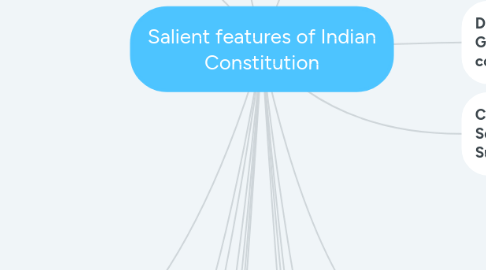Salient features of Indian Constitution
by Abhishek Hirewodeyar


1. Blend of rigidity and flexibility
1.1. Indian const is rigid for few amendments - Special Majority and flexible for few - Simple Majority
1.2. 4 types of Majority : Simple, Absolute, Effective and Special
2. Federal System with Unitary bias
2.1. Quasi federal (KC Wheare), Cooperative federalism (Granville Austin)
2.2. Federal features
2.2.1. Two governments
2.2.2. division of powers
2.2.3. independent judiciary
2.2.4. bicameralism
2.3. Unitary features
2.3.1. Single citizenship
2.3.2. appointment of state governors
2.3.3. all-India services
2.3.4. Emergency provisions
2.4. Indian Federalism is not the result of an agreement by the states and no state has the right to secede from the federalism
3. Parliamentary form of government
3.1. principle of cooperation between legislative and executive organs
3.2. Features of Parliamentary govt
3.2.1. nominal and real executives
3.2.2. majority party rule
3.2.3. collective responsibility of the executives to the legislature
3.2.4. membership of ministers in the legislature
3.2.5. leadership of PrimeMinister and ChiefMinister
3.2.6. Dissolution of Lower House
4. Integrated and Independent Judiciary
4.1. Independent - separate from legislatives and executives
4.2. Integrated - SC, HC, District Courts etc
5. Directive Principles of State Policies
5.1. Novel Feature of Const
5.2. establishing a Welfare State
5.3. Non-justiciable
6. A Secular State
6.1. no particular official religion
6.2. liberty of belief, faith and worship
6.3. Art 14, 15, 16, 25, 26, 27, 28, 29, 30, 44
6.4. abolished communal representation
7. Single Citizenship
8. Emergency Provisions
8.1. National Emergency - Art 352
8.2. State Emergency (president's rule) - Art 356,365
8.3. Financial Emergency - Art 360
9. Co-operative Societies
9.1. 97th CA, 2011
9.2. right to form cooperatives - fundamental right under Art 19
9.3. DPSP : promote cooperatives under art 43B
9.4. Part 9-B : The Cooperative Socities
10. Lengthiest written constitution
10.1. originally 395 articles, 22 parts and 8 schedules
10.2. present - 470 articles, 25 parts and 12 schedules
10.3. not only contains fundamental principles of governance but also detailed administrative provisions
11. Drawn from many sources - like GOI Act,1935 , US const, USSR const, Britain Const etc
12. Combination of Parliamentary Sovereignity and Judicial Supremacy
12.1. The SC can declare parliamentary laws unconstitutional and on the other hand Parliament can amend major portion of Constitution
13. Fundamental rights
13.1. serves as limitations on the tyranny of the executive and legislature
13.2. justiciable, SC can issue writs (art 139 and 226)
13.3. not absolute and subject to reasonable restrictions
13.4. 6 FR
13.4.1. Right to Equality
13.4.2. Right to Freedom
13.4.3. Right against Exploitation
13.4.4. Right to Freedom of Religion
13.4.5. Cultural and Eductaional Rights
13.4.6. Right to Constitutional Remedies
14. Fundamental Duties
14.1. added by 42nd AA, 1976
14.2. Swaran Singh Committee
14.3. Part IV-A - Article 51A
14.4. Eleven Fundamental Duties
15. Universal Adult Franchise
15.1. 18yrs min - 61st AA, 1988
16. Independent Bodies
16.1. Election Comission
16.2. Comptroller and Auditor General
16.3. UPSC, SPSC
16.4. Attorney General of India
16.5. Advocate General of State
17. Three Tier Government
17.1. 73rd CA,1992 : Panchayats
17.1.1. Part 9, Schedule 11
17.2. 74th CA, 1992: Muncipalities
17.2.1. Part 9-A, Schedule 12
